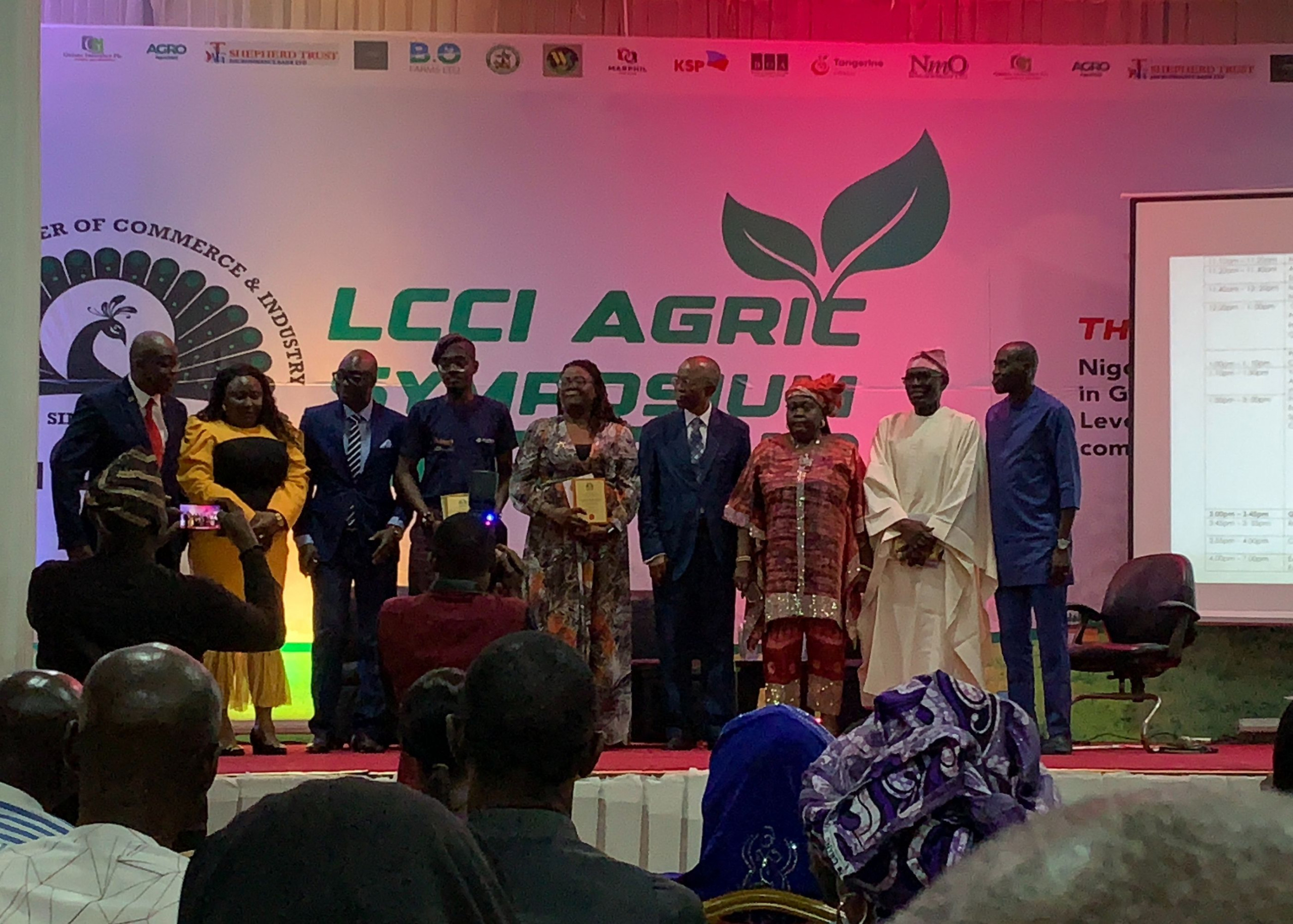The Agric Symposium hosted by the International Chamber of Commerce (ICCI) and the Lagos Chamber of Commerce and Industry (LCCI) brought together key stakeholders, including government officials, industry experts, and enthusiastic youths, to discuss the present challenges and explore future opportunities within the sector.
Agriculture has long been the backbone of Nigeria’s economy, providing food, jobs, and raw materials for various industries.
The symposium, which took place at the LCCI Conference and Exhibition Centre, was a call to action for stakeholders to embrace new technologies, rethink current strategies, and empower the next generation of farmers. With vibrant discussions ranging from practical agricultural techniques to modern financial tools, the event targeted boosting productivity and sustainability in Nigeria’s agriculture sector.
The youth: Nigeria’s agricultural game changers
Youth engagement was at the heart of the conversations on both days, underscoring the sector’s need for fresh perspectives and innovation. With over 60% of Nigeria’s population under 25, the future of agriculture lies in empowering the youth, equipping them with the necessary tools, and making agriculture more attractive to the younger generation.
One of the standout speakers, a Lagos State government representative, highlighted the Lagos Agripreneurship Program (LAP) under the Agricultural Training Institute, Epe, which offers free one-month training programs for youths. After completing the training, participants go through internships that provide hands-on experience across the agricultural value chain. This initiative is seen as a stepping stone toward self-reliance and job creation.
“We need to train our youth and make them experts in modern agriculture. Lagos State is ready to support this by offering free training and internships. We want young people to become active players in the food systems,” remarked the official. The message was clear: agriculture is no longer the outdated, labour-intensive sector it once was, and with government support, youth can become key drivers of agricultural innovation.
Technology, food security, and finance
A recurring theme throughout the event was the role of technology in reshaping Nigerian agriculture. The symposium served as a melting pot of ideas, particularly around modern farming techniques, precision agriculture, and agro-processing.
On Day One, Mosunmola Umuru, a leading agricultural expert, spoke passionately about leveraging technology to improve yields and reduce wastage. She stressed the importance of data in farming, advocating for the use of precision agriculture where farmers rely on real-time data to make informed decisions about planting and harvesting.
“Gone are the days when we farm based on outdated information. Technology allows us to know the quality of our soil, monitor crop health, and maximise yields efficiently,” Umuru said, encouraging participants to adopt tools like crowdfunding to raise capital for innovative farming ventures.
With Nigeria relying heavily on imported raw materials such as wheat, barley, and soybeans, the symposium attendees called for local self-sufficiency to improve food security.
Bisola Olusanye, Lagos State Commissioner of Agriculture, emphasised the government’s commitment to storage and logistics, which are crucial in reducing post-harvest losses. The idea of establishing a national food bank was floated as well to tackle food wastage and was met with positive responses, as it could significantly improve food availability during shortages.
However, financial constraints remain one of the biggest barriers to progress in agriculture.
The managing director of the Bank of Agriculture (BOA), Awali Ali Hassan, who was represented by Adekunle Osho, the regional director of the bank, outlined initiatives aimed at financing agricultural enterprises across the value chain. He noted that the bank is working on programs to make funds more accessible to farmers, particularly through single-digit interest loans, which would ease the financial burden for many smallholder farmers. “We are supporting the entire value chain, from nano enterprises to micro and medium-scale businesses,” Osho assured the attendees.
The conversation carried into Day Two, where the need for irrigation solutions, particularly solar-powered systems, was identified as a game-changer for year-round farming. Olaoluwa Olani Ajayi, a participant, shared the success story of a Sokoto farmer who earned over ₦5 million by using irrigation, demonstrating how this technology can dramatically impact farming outcomes.
Multinational companies and the role of Agro-processing
An interesting insight shared at the symposium was the growing presence of multinational companies in Nigeria’s agricultural landscape.
These companies rely heavily on raw materials like maize, wheat, and soybeans, which are increasingly sourced from outside the country because Nigerian producers are not able to meet their demands.
“Multinational companies have improved varieties, whether genetically modified (GM) or not. These crops are grown elsewhere, while we are still importing them,” a panelist lamented. However, he was quick to dispel fears around GMOs, citing scientific checks that show they are safe for consumption.
The symposium also featured discussions on agro-processing, a sector that holds massive potential for economic growth.
Chief Adegoke Adeyemi, an agro-processing expert, highlighted the importance of starting small and scaling up. “You don’t need massive machinery to begin processing. Start small, understand your market, and gradually build up,” he advised. His practical approach resonated with many participants, especially the youth, who are often daunted by the perceived costs of agro-processing.
Chief Adeyemi also underscored the need to mentor young farmers. “Perception is key. Youth need to see agriculture as a viable career path, and mentorship plays a crucial role in guiding them through the challenges,” he added.
This sentiment was echoed on Day Two when a poultry farmer made a compelling case for collaboration between maize producers and poultry farmers to stabilise prices and secure supply chains. This partnership would not only provide maize farmers with a reliable market but also offer poultry farmers a consistent source of feed, ultimately benefiting both parties.
Government’s role in supporting innovation and self-sufficiency
The Lagos State Government actively took part in the symposium, discussing Nigeria’s food security challenges and the complexities of fair pricing. This showed the administration’s commitment to improving agriculture.
Bisola Olusanye reaffirmed the government’s efforts to promote domestic self-sufficiency, emphasising that even in urban areas, subsistence farming could contribute significantly to food security.
She spoke about the government’s investment in storage facilities, logistics, and farm implements, all geared toward supporting local farmers. Olusanye encouraged attendees to leverage the government’s initiatives, particularly the Enterprise Development Program (EMP), which aims to empower farmers and agri-preneurs across various value chains.
Day Two expanded on this theme, with farmers raising concerns about consumers demanding prices below the cost of production. To address these pricing issues, several participants suggested the reintroduction of Nigeria’s Commodity Board, which would regulate prices and ensure that farmers are protected from market volatility. This measure could help stabilise prices, especially for smallholder farmers, and support a more equitable agricultural market.
Exhibitions showcasing innovation
The symposium also provided a platform for exhibitors to showcase some of the most cutting-edge technologies in agriculture. Highlights included demonstrations of mechanized farming tools, solar-powered irrigation systems, and improved seed varieties that promise higher yields.
One of the standout exhibitions focused on the potential of Black Soldier Fly larvae as an alternative feed for poultry and fish, which could significantly reduce feed costs for farmers. This innovative research was met with great interest, particularly as the cost of feed remains one of the most pressing challenges facing animal producers in Nigeria.
The role of policy and advocacy
As the discussions progressed, the need for strong advocacy and policy reform became evident. Participants called for organised efforts to lobby for favorable policies that would drive agricultural growth. One suggestion was that organisations like the Lagos Chamber of Commerce and Industry should take on a more active role in advocating for farmers, using data and evidence to support their push for policy changes.
Several attendees also emphasised the need to form new agricultural associations that could advocate effectively without being hindered by political interference. These new groups, they argued, would be critical in ensuring that the voices of young farmers, in particular, are heard and represented.
A collaborative vision for the future
The Agric Symposium was not just a one-off event; it marked the beginning of a collaborative effort to reshape Nigeria’s agricultural sector. The LCCI’s Business Education Services and Training Department and its Young Business Leaders Group pledged to work with stakeholders to develop detailed frameworks that would turn ideas discussed at the symposium into actionable projects.
From government initiatives to private sector involvement, the event highlighted the need for collective efforts to boost the agricultural value chain, increase youth participation, and reduce the country’s reliance on food imports.
As the symposium drew to a close, the resounding message was one of hope and action. Agriculture is no longer a mere subsistence activity —it is a business, a technological frontier, and a sector that can catapult Nigeria into a new era of economic prosperity. By embracing technology, leveraging government support, and fostering youth engagement, Nigeria’s agriculture holds the promise of growth and sustainability for years to come.
The 2024 Agric Symposium ended with a powerful charge to all stakeholders —farmers, policymakers, private sector players, and especially the youth— to rise and take ownership of Nigeria’s agricultural destiny. With the frameworks already in place, the future of Nigerian agriculture looks bright, provided that the insights and collaborations forged at the event continue to be nurtured.



